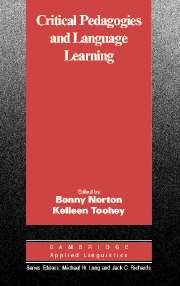Book contents
- Frontmatter
- Contents
- List of contributors
- Acknowledgments
- Chapter 1 Critical pedagogies and language learning: An introduction
- I RECONCEPTUALIZING SECOND LANGUAGE EDUCATION
- II CHALLENGING IDENTITIES
- Chapter 6 Representation, rights, and resources: Multimodal pedagogies in the language and literacy classroom
- Chapter 7 Subversive identities, pedagogical safe houses, and critical learning
- Chapter 8 “Why does this feel empowering?”: Thesis writing, concordancing, and the corporatizing university
- Chapter 9 Modals and memories: A grammar lesson on the Quebec referendum on sovereignty
- III RESEARCHING CRITICAL PRACTICES
- IV EDUCATING TEACHERS FOR CHANGE
- Author Index
- Subject Index
Chapter 9 - Modals and memories: A grammar lesson on the Quebec referendum on sovereignty
Published online by Cambridge University Press: 05 October 2012
- Frontmatter
- Contents
- List of contributors
- Acknowledgments
- Chapter 1 Critical pedagogies and language learning: An introduction
- I RECONCEPTUALIZING SECOND LANGUAGE EDUCATION
- II CHALLENGING IDENTITIES
- Chapter 6 Representation, rights, and resources: Multimodal pedagogies in the language and literacy classroom
- Chapter 7 Subversive identities, pedagogical safe houses, and critical learning
- Chapter 8 “Why does this feel empowering?”: Thesis writing, concordancing, and the corporatizing university
- Chapter 9 Modals and memories: A grammar lesson on the Quebec referendum on sovereignty
- III RESEARCHING CRITICAL PRACTICES
- IV EDUCATING TEACHERS FOR CHANGE
- Author Index
- Subject Index
Summary
Introduction
Like many teachers, I came to understand theory through the back door of pedagogy. Extended graduate study was supported by extensive teaching in adult English as a second language (ESL) community programs. These two worlds meshed nicely. The university offered conceptual details. The community center provided a setting to explore applications - what it might mean, for example, to realize a second language (L2) pronunciation lesson via feminist poststructural notions of discourse and subjectivity (Morgan, 1997, 1998). With time, I grew less certain of the natural order of things. I began to reflect more upon the human diversity and specialized language practices that came together and shaped identity formation in my classroom and in others like it. These ESL sites - in which close attention to form and meaning were often carefully managed - could not be simply theorized as “disciplinary regimes” (cf. Foucault, 1975/1979) or the relics of a modernist, rationalist epistemology. I came to see these sites as distinct. They seemed to bring subjects into discourse in ways quite unlike the doctoral programs in which most identity theories are conceived and fostered (see Morgan, in press). Subsequently, I started to focus on a notion underpinning this chapter - that as applied linguists, we might see ourselves as contributing unique, language-based insights to the critical theories from which we borrow.
Such contributions are advanced when we take the experiences and observations of ESL practitioners seriously.
- Type
- Chapter
- Information
- Critical Pedagogies and Language Learning , pp. 158 - 178Publisher: Cambridge University PressPrint publication year: 2004
- 16
- Cited by



